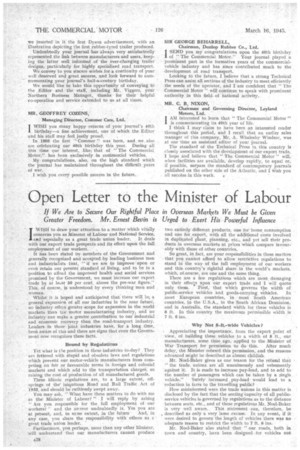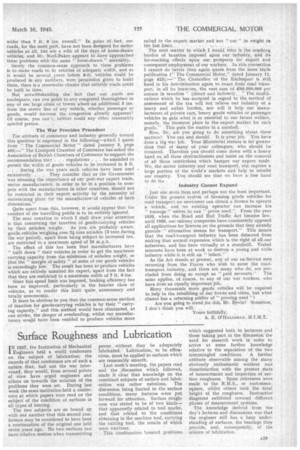Open Letter to the Minister of Labour
Page 39

Page 40

If you've noticed an error in this article please click here to report it so we can fix it.
if We Are to Secure Our Rightful Place in Overseas Markets We Must be Given Greater Freedom. Mr. Ernest Bevin is Urged to Exert His Powerful influence
iWISH to draw your attention, to a matter which vitally concerns you as Minister of Labour and National Service, ad especially as a great trade union leader. It deals with our export trade prospects and its effect upon the full employment of our workers. . It has been stated by members of the Government and generally recognized and accepted by leading business men and industrialists that, " if we are to improve-upon or even retain our present standard of living, and to be in a position to afford the improved health and social services promised by the Government, we must increase our export trade by at least 50 percent. above the pre-war figure." This, of course, is understood by every thinking maa and woman.
Whilst: it is hoped and anticipated that there will be a general expansion of all our industries in the near future, no industry offeis greater scope for expansion in the world markets thaw the motor manufacturing industry, and no industry can make a greater contribution to our industrial and economic recovery than the road-transport industry. Leaders in these joint industries have, for a long time, been aware of this and there are signs that even the Government now recognizes these facts.
Bound by Regulations
. Yet what is the position in these induStries to-day? They are fettered with stupid and obsolete laws and regulations which prevent our motor-vehicle manufacturers from competing on fair or favourable terms in foreignand colonial market i and which add to the transpOrtation charges, so raising the'coSt of production of all manufactured goods.
These idiotic regulations are, to a large extent, offsprings of the' iniquitous Road and Rail Traffic Act of 1933, and should be ruthlessly swept away. .
You may ask, " What have these matters to do with me Cs the Minister of Labour? " I will reply by asking " Are you responsible for the full employment of our workers? '. and the dniwur undoubtedly is. Yes you are
at present, and, to sciaie extent, in the future And, in any case, you share the responsibility with ' others -as a great trade union leader. ' . Furthermore, you perhaps, more than any other Minister, will understand that our manufacturers cannot produce two entirely different products, one for home, consumption and one for export, with all the additional costs involved in duplicated plant, planning, etc., and yet sell their products in overseas markets at prices which compare favourably with those of other countries.
So great, in fact, are your responsibilities in these matters that you cannot afford to allow restrictive regulations to stand in the way of the full employment of our workers and this country's rightful share in the world's markets, which, oLcourse, are one and the same thing.
There are a few regulations which are most damaging in their effects upon our export trade and I will quote only them. First, that which governs the width of public-service vehicles 'and goods-carrying vehicles. In
most European countries, in most South American countries, in the U.S.A., in the South African Dominion, and in Australia, the standard width for these vehicles is 8 ft. In this country the maximum permissible width is 7 ft. 6 ins.
Why Not 8-ft-wide Vehicles-?
Appreciating the importance, from the export point of view, of building these vehicles to a width of 8 ft., our manufacturers, some time ago, applied to the Minister of War Transport for permission to do this. After much delay, the Minister refused this permission, and the reasons advanced might be described as almost childish.
Mr. Noel-Baker gives as one reason for the refusal that " the trade, unions. are all unanimously and vehementlyagainst IL It is made to increase pay-load, and to add to the number of passengers which can be taken by a Angle vehicle." Surely increased ,pay-load' would lead to a reduction in fares to the travelling public?
How misinformed were the trade unions in this matter is disclosed by the fact that the seating-capacity of all publicservice vehicles is governed by regulations as to the distance between seats, etc., and of these regulations Mr. Noel-Baker is very well aware. This statement can, therefore, be , described as only a very lame excuse. In any event, if it were desired to govern the length of vehicles there was no adequate reason to restrict the width to 7 ft. 6 ins: Mr. Noel-Baker also stated that "our roads, both in town and' country, have been designed for vehicles not wider than 7 ft. 6 ins. overall." In point of fact, our roads, for the most part, have not been designed for motor vehicles at all, but are a relic of the days of horse-drawn vehicles, and Mr. Noel-Baker. appears to have approached these problems with the same " horse-drawn " mentality, Surely the common-sense approach to these problems is to make roads to fit vehicles of adequate width, and as it would be several.. years before 8-ft. vehicles could be produced in any numbers, were permission given to build them, there is a reasonable chance that suitable roads couldbe built in time.
But notwithstanding the fact that our roads are inadequate, can you point to any congested thoroughfare in any of our large cities or towns where an additional 3 ins, from the centre line of any vehicle, whether passenger or goods, wouldincrease the congestion already apparent? Of course, you can't, neither could any other reasonably minded person.
The War Provides Precedent The attitude of commerce and industry, generally toward this question is expressed in the following—which I quote from " The Commercial Motor " dated January 5, page 405:—" The Liverpool Chamber of Commerce has asked the Association of British Chambers of Commerce to support the recommendation that . . regulations . . . be amended to permit the width of goods vehicles to be increased to 8 ft.
• • . during the war years such vehicles have been used extensively. • , . They consider that as the Government was stressing the importance of oar post-war export trade, motor manufacturers, in order to be in a position to compete with the manufacturers in other countries, should not be restricted in. their export activity by the necessity of maintaining plant for the manufactures of vehicles of both dimensions."
Quite apart from this, however, it would appear that the comfort of the travelling public is to be entirely ignored.
The next vexation to which I shall draw your attention is that concerning the taxation of goods-carrying vehicles by their unladen weight. As you are probably aware, goods vehicles weighing over 21.tons unladen (3 tons during the war period), apart from being subject to increased tax, are restricted to a maximum speed of 20 m.p.h.
The effect of this has been that manufacturers have " built down " their vehicles in order to get the maximum carrying capacity from the minimum of unladen weight, so that the "margin of safety " of some of our goods vehicles is exceedingly low. The result has been to-produce vehicles which are entirely unsuited for export, apart from the fact that they are restricted to a maximum width of 7 ft. 6 ins. Since this speed limit was imposed, braking efficiency. has been so improved, particularly in the heavier class of vehicles, as to render this limit quite, unnecessary and totally uneconomic. It must be obvious to you that the common-sense Method of taxation for goods-carrying vehicles is by their "carrying capacity," and this method would have eliminated, at one stroke, the danger of overloading, whilst our manufacturers would have been enabled to produce vehicles more suited to the export market and not " cut " in weight to the last limit, . .
The next matter to which I would refer is the crushing, burden of taxation imposed upon our industry, -and its far-reaching effects 'upon our prospects for export and consequent employment of our workers. In this connection I cannot do better than again quote from the same trade publication (" The Commercial Motor," dated January 12, page 423):---" The Chancellor of the Exchequer is still_ • fixed in his determination again to exact from road transport, in all its branches, the vast sum of 49,0,000;000 per annum in taxation" (direct and indirect). . The modifications which he has accepted in regard to the method of assessment of the tax will not relieve our industry of a heavy and unfair burden, nor will it help our manufacturers of private cars., heavy goods' vehicles or passenger vehicles to gain ,what is so essential to our future welfare, namely, the foremost place in the export market for such goods." This puts the matter in a nutshell.
Now, Sir, are you going to do something about these matters? You can and should. It is your job. You have done a big war job. Your Ministerial stature is far greater than that of many of your colleagues, who should be trounced. Therefore you should come down with a heavy hand on all these obstructionists and insist on the removal of all those restrictions which hamper our export trade, We, the motor industry and road transport, can capture a large portion of the workl's markets and help to rebuild our country. You should see that we have a' free hand to do ita
Industry Cannot Expand
. Just one 111nre item. and perhaps not the least important. Under the plesent system of licensing goods vehicles for road transport no newcomer can obtain a licence to operate a vehicle, and no existing operator can increase his "
tonnage.'' unless he can " prove need." From the year 1933, when the Road and Rail Traffic Act became law, until 1939, our railway companies have consistently opposed all applications for licences on the grounds that they already provide " alternative means for transport," This means that the road-transport industry has been debarred from making that normal expansion which is the right of all our industries, and has been virtually at a standstill. Vested interests have been at work to destroy a young and virile industry while it is still an "infant."
As the Act stands at present, any of our ex-Service men returning from the Forces who wish to enter the roadtransport industry, and there are many who do, are pre cluded from doing so except as " paid servants." The same applies, of course, to any of our war workers, who have done an equally important job. Many thousands more goods vehicles will be required to help in the rebuilding of our towns and cities, but what chance has a returning soldier of " proving need "? Are you going to stand for, this, Mr. 13evin? Somehow, I don't-think you will. , Yours faithfully,
A. E. IYHALLORAN, M.I.M.T.



























































